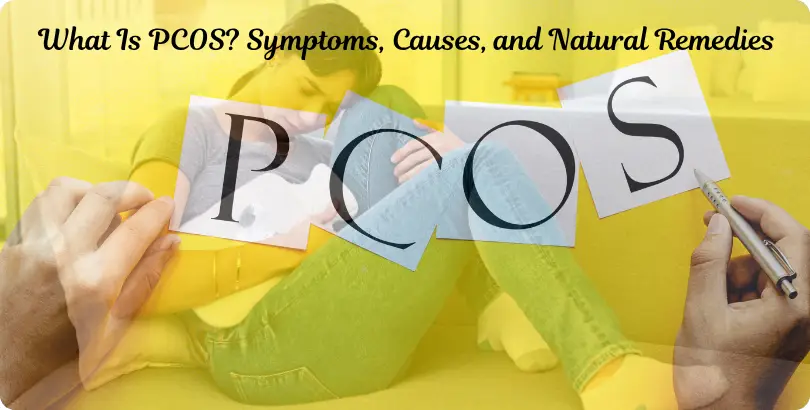
What is PCOS and How Does It Affect Your Health?
What is PCOS?
Polycystic Ovary Syndrome (PCOS) is a hormonal disorder that affects individuals assigned female at birth, typically during their reproductive years.
Surprisingly, many people with PCOS remain undiagnosed. According to the World Health Organization (WHO), nearly 70% of those affected worldwide haven’t received a proper diagnosis.
PCOS impacts the ovaries — the organs responsible for producing estrogen and progesterone, the hormones that regulate the menstrual cycle. The ovaries also produce small amounts of male hormones called androgens.
The three primary characteristics of PCOS include:
Hormonal imbalance: Reduced ovulation leads to imbalances in estrogen, progesterone, FSH, and LH levels.
Ovarian cysts: Small, fluid-filled sacs (follicles) form inside the ovaries. These follicles contain immature eggs that often fail to mature or trigger ovulation.
Excess androgens: Higher-than-normal levels of male hormones disrupt ovulation, causing irregular periods and fertility issues.
Discover what is PCOS, its causes, symptoms, and treatment options. A complete guide to understanding and managing this common hormonal disorder. Polycystic ovary syndrome, or PCOS, is an endocrine (hormonal) disorder that can lead to the development of several ovarian cysts, excess hair growth, inflammation and other signs and symptoms.
PCOS: Why Diet Matters
Individuals with polycystic ovary syndrome are also at higher risk of having accompanying obesity, systemic inflammation, metabolic syndrome, insulin resistance, or any combination of such chronic diseases. They all increase the likelihood of diabetes, cardiovascular disease and other conditions. Discover what is PCOS, its causes, symptoms, and treatment options. A complete guide to understanding and managing this common hormonal disorder.
Managing PCOS starts with understanding your body—balance your hormones with mindful nutrition, movement, and self-care every day. Stathos estimates that insulin resistance occurs in 50% to 75% of PCOS individuals. She describes, “Insulin is a key which unlocks cells and allows glucose to enter. Glucose is a source of energy. The body has a great ability to produce insulin, but in those with insulin resistance, the insulin fails to pass glucose into the cells efficiently. The result is glucose accumulation within the blood and the fat cells, which increases the risk of diabetes.”.
“Not everyone with polycystic ovary disease develops these complications, but for those that do, achieving and sustaining a healthy weight is our priority number one,” Stathos says, “and that begins with diet and exercise.”
Discover what is PCOS, its causes, symptoms, and treatment options. A complete guide to understanding and managing this common hormonal disorder. What is the ideal diet for PCOS patients? Although Stathos treats each patient differently, she emphasizes that most dietitians recommend the Mediterranean diet, and for a very good reason. It has a variety of foods in all food groups, so it is simple to adhere to as a lifestyle choice instead of an immediate solution.
“Managing PCOS starts with understanding your body—balance your hormones with mindful nutrition, movement, and self-care every day.”
Central Mediaa
Diet for PCOS: What to Avoid
Managing PCOS starts with understanding your body—balance your hormones with mindful nutrition, movement, and self-care every day. “Studies indicate individuals with PCOS demonstrate signs of whole-body inflammation, which is connected with heart disease and other disease. The Mediterranean diet cuts out saturated fats, processed meats and refined sugar, making it an effective tool to combat inflammation,” Stathos explains.
Discover what is PCOS, its causes, symptoms, and treatment options. A complete guide to understanding and managing this common hormonal disorder. She adds that other balanced diets focusing on non-starchy vegetables and fruits, lean protein, healthy carbohydrates and low-fat dairy can make individuals with PCOS healthier and avoid complications.
Foods to Limit with PCOS
Stathos points out that single foods are rarely the cause of diseases like polycystic ovary disease, and similarly, no one food is likely to be a “magic bullet” in bringing about health.
Nevertheless, she observes, consuming excessive foods linked to inflammation can exacerbate PCOS symptoms and increase the risk of tens of thousands of other diseases that individuals with PCOS are susceptible to contracting, including heart disease.
Individuals with PCOS need to exclude these foods that tend to increase inflammation:
• French fries, potato chips, corn chips and fried chicken or fish (fried foods)
• Butter or margarine (saturated fats)
• Roast beef and steaks, hamburgers, processed luncheon meat and hot dogs (red meat)
• Cakes, cookies, candy and pies (processed snacks)
• Prepackaged cereal with lots of sugar, instant oatmeal, granola
• Sports drinks, teas and sodas (sugary drinks)
• Alcoholic drinks
• Refined flour, white bread, rolls, pizza crust and pasta
• White rice

What is PCOS and How Does It Affect Your Health?
Best Foods for PCOS
“Switching out whole, unprocessed choices for inflammatory foods can pave the way for healthier long-term health,” Stathos says. Options like these of the Mediterranean diet can lead you to a healthy weight and help handle PCOS symptoms with lots of nutrition and wonderful flavor:
• Omega-3 fat fish, such as salmon, baked or broiled
• Olive oil rather than butter or margarine
• Beans and other protein-rich legumes rather than meat
• Non-starchy vegetables like leafy greens (spinach, kale, escarole, endive, lettuce, etc.), tomatoes, mushrooms, peppers, broccoli, cauliflower, snow peas, celery and fennel
• Whole grains, including brown rice, barley, sorghum and others. Whole grain breads and pastas can assist individuals with PCOS in avoiding spikes in blood sugar.
• Whole fruit as dessert. Fiber in whole fruit will keep you full, aid digestion and prevent the absorption of its sugars into the bloodstream.
Drink water and low- or no sugar drinks
Stay hydrated: Drink water, coffee or tea, unsweetened. Rather than soda, drink seltzer with a little fruit juice.
Fad Diets for PCOS? Not So Fast
It is critical to weight loss in managing insulin resistance but adhering to diet fads is not the way to go. Any diet that involves the elimination of an entire food group, i.e., carbohydrates, is not sustainable for effective weight management.
“Cutting out carbs is not something that I advise,” she says. “But selecting more low-glycemic carbohydrates (ones that don’t cause a spike in blood sugar) like fiber-rich whole grains and non-starchy vegetables can be beneficial. Discover what is PCOS, its causes, symptoms, and treatment options. A complete guide to understanding and managing this common hormonal disorder. The aim is to stabilize blood sugar and not have tremendous dips and spikes. Eating little, frequent meals can really work, along with balanced snacks so you’re consuming about every four hours.”
Since keeping blood sugar levels stable is crucial, Stathos adds that intermittent fasting might not be the most suitable for patients with polycystic ovary syndrome. She adds that other patients might eat too many calories during the periods of eating. Intermittent fasting is a new method of losing weight and it is effective for some individuals, but more studies are required to determine whether it is safe and effective in individuals with PCOS.
PCOS: Get in control
Learn What is PCOS, including its causes, symptoms, and treatments. A complete guide to understanding and managing this hormonal condition. Stathos states in addition to diet, exercise and other healthy lifestyle practices, such as adequate rest and stress management, can function to manage PCOS symptoms, reduce your chance of building chronic disease and enhance your life. Discover what is PCOS, its causes, symptoms, and treatment options. A complete guide to understanding and managing this common hormonal disorder.
“If you are diagnosed with polycystic ovary syndrome, don’t assume that you are doomed to a life of poor health,” says Stathos. “There is plenty you can do to take control, reduce symptoms and stay healthy.”
Disclaimer:
Content on this site is for informational purposes only and not medical advice. Consult a healthcare professional before making health changes.












2 Comments
[…] “Managing PCOS starts with understanding your body—balance your hormones with mindful nutrition,… […]
[…] “Here is a curated list of 100 free business-listing sites each with a Domain Authority (DA) of 40… […]